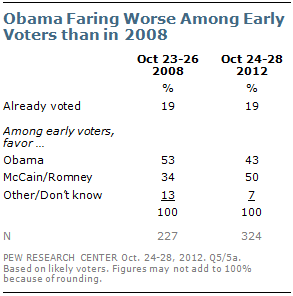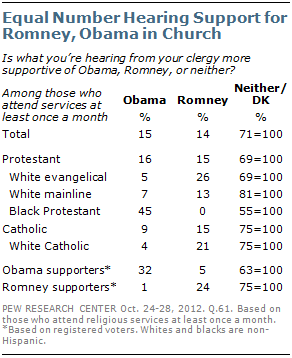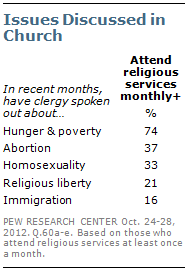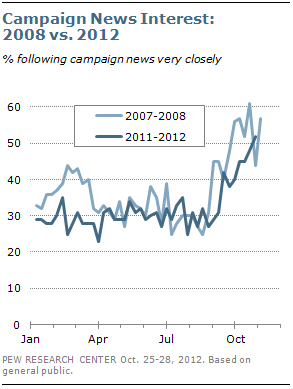Overview
Just as the presidential race is deadlocked in the campaign’s final days, the candidates are also running about even when it comes to the ground game. Voters nationally, as well those in the closely contested battleground states, report being contacted at about the same rates by each of the campaigns. And with a fifth of likely voters reporting already having cast their ballots, neither Barack Obama nor Mitt Romney has a clear advantage among early voters. This is in sharp contrast to early voting at this point four years ago, which favored Obama by a wide margin.

Clearly, both campaigns are concentrating their efforts in the nine battleground states: Fully 78% of registered voters in those states say they have received something in the mail from one or more of the presidential candidates, while 60% have gotten pre-recorded calls about the campaign. Nationwide, 49% have received mail from the candidates and 42% have gotten campaign robocalls.
The latest national survey by the Pew Research Center for the People & the Press, conducted Oct. 24-28 among 1,678 registered voters, including 1,495 likely voters, finds that about a third of all voters (32%) say they have been contacted by the Obama campaign (11%) or both campaigns (21%), while about as many (31%) say they have been contacted by the Romney campaign (10%) or both (21%). The survey was conducted before Hurricane Sandy hit the U.S.
Similarly, among voters in the nine battleground states, nearly identical percentages say they have been contacted by both campaigns (51% by Obama or both, 52% by Romney or both.)
There are only modest differences in reported campaign contacts between Obama and Romney voters in the nine battleground states. Large majorities of both Obama voters and Romney voters say they

have received mail from the candidates and pre-recorded campaign calls. And identical percentages of both groups say they have received personal phone calls from someone about the campaign (40% each).
However, Obama voters in the battleground states are more likely than Romney voters to say that they have received emails or text messages about the campaign (43% vs. 30%) or have been visited at home by someone talking about the campaign (25% vs. 14%).
More than six-in-ten (63%) Obama voters in battleground states say they have been contacted by either the Obama campaign (25%) or both campaigns (38%). About as many Romney voters (62%) in these states say they have been contacted by either the Romney campaign (21%) or both campaigns.
Early Voting 2008-2012
Both campaigns have made efforts to increase early voting, particularly in the battleground states. Overall, about a quarter of registered voters (26%) who have been contacted by either the Obama campaign, the Romney campaign, or both, say they have been encouraged to vote before Election Day. Among voters in the battleground states who have been contacted by the campaigns, 36% have been encouraged to vote early.

The Pew Research Center survey found that the race is even among all likely voters nationwide (47% Obama, 47% Romney). Unlike the last campaign, the race also is close among voters who say they have already voted.
In the poll, conducted Oct. 24-28, 19% of likely voters say they have already voted; that is unchanged from the same week in the 2008 campaign (Oct. 23-26, 2008). Currently, Romney holds a seven-point edge among early voters (50% to 43%); because of the small sample, this lead is not statistically significant. At this point four years ago, Obama led John McCain by 19 points (53% to 34%) among early voters.
Campaign Activism
The poll finds that Romney’s supporters are more likely than supporters of Obama to say they are highly engaged and certain to vote. But on other measures of campaign activism there is little difference between supporters of the two candidates.

One-in-five Obama voters (20%), and about the same percentage of Romney voters (18%), say they have followed a candidate’s updates on Twitter or Facebook. A somewhat greater share of Obama voters than Romney voters say they have contributed any money to the presidential candidates (23% of Obama voters, 15% of Romney voters).
There are age differences in the percentages of voters who follow the candidates on social networks. About a quarter (26%) of voters younger than 30 follow candidate updates on Twitter or Facebook. That compares with 24% of voters 30-to-49, 15% of those 50-to-64 and 8% of those 65 and older.
Robo-Calls: Most Don’t Listen
Far more voters in battleground states receive pre-recorded calls about the campaign than do voters in

less contested states. But their reactions are similar: 64% of voters in battleground states who get such calls do not listen to them. Similar percentages of voters in red states (72%) and blue states (71%) hang up on robocalls.
Among those who do not listen to robocalls, overwhelming percentages in all states, including 77% in battleground states, treat them as a minor annoyance. Just one-in-five voters in battleground states, and similar percentages in red and blue states, who hang up on robocalls say such calls make them angry.
Politics from the Pulpit
While many regular churchgoers say they have been encouraged to vote by their clergy, relatively few say church leaders are discussing the candidates directly or favoring one candidate over the other. Black Protestants are far more likely than white Protestants or Catholics to say they are hearing about the candidates and the importance of voting, and the messages they are hearing overwhelmingly favor Barack Obama.
Among those who attend religious services at least once or twice a month, about half (52%) say their clergy have spoken out about the importance of voting over the past few months. Just one-in-five (19%)

say their clergy have spoken about the candidates themselves, according to the survey, conducted by the Pew Forum on Religion & Public Life and the Pew Research Center for the People & the Press.
Nearly eight-in-ten (79%) black Protestant churchgoers say their clergy have spoken out about the importance of voting, compared with about half of white evangelical Protestant (52%) and white Catholic (46%) churchgoers. Only about a third (32%) of white mainline Protestants who attend services say their clergy have discussed the importance of voting.
Black Protestants are twice as likely as churchgoers overall to be hearing about the candidates at church. Among regular churchgoers, four-in-ten (40%) black Protestants say their clergy have spoken directly about the candidates, compared with 17% of white Catholics, 12% of white evangelicals and just 5% of white mainline Protestants.

Most regular churchgoers say the messages they are hearing in church are neutral when it comes to the 2012 election – whether or not they mention the candidates directly. Only about three-in-ten say what they are hearing at church is more supportive of one candidate or the other. Among those who feel their clergy’s messages favor a candidate, roughly equal numbers say the messages support Obama (15%) as Romney (14%).
What people are hearing varies greatly by race. Nearly half (45%) of black Protestant churchgoers say the messages they hear at church favor a candidate, and every one of those says the message favors Obama. Fewer white churchgoers say they are hearing things that favor a candidate, but among those who are, the messages are far more favorable to Romney than Obama. In particular, white evangelical churchgoers say their clergy have tended to be more supportive of Romney (26%) than Obama (5%). Among white Catholic churchgoers, 21% say their clergy’s messages have been more supportive of Romney, compared with 4% who say the messages have been more supportive of Obama.
Overall, few voters are hearing messages at church that conflict with their own voting preferences. Among churchgoers who favor Obama, 32% say what they are hearing at church is supportive of Obama, compared with just 5% who say the messages from their clergy are more supportive of Romney. Similarly, among Romney voters who attend services at least monthly, more are hearing messages favorable to Romney (24%) than Obama (1%).
Clergy Discussion of the Issues
Three-quarters of those who say they attend religious services at least monthly (74%) say their clergy

have recently spoken out about hunger and poverty. Roughly one-third say their clergy have spoken out about abortion (37%) and homosexuality (33%). One-fifth of those who attend religious services at least monthly have heard their clergy speak out about government policies they believe restrict religious liberty (21%), and 16% say their clergy have addressed immigration.
Large majorities of churchgoers in all major religious groups say their clergy have spoken out about hunger and poverty, including 83% of white Catholics, 74% of black Protestants, 73% of white mainline Protestants and 69% of white evangelicals.

Catholics report having heard about abortion from the pulpit at higher rates than other groups; 62% of Catholics say their clergy have discussed abortion, compared with 36% of white evangelical Protestants, 29% of black Protestants and 19% of white mainline Protestants. Three-in-ten Catholics (32%) also say their clergy have spoken out about religious liberty; fewer Protestants (18%) say their clergy have discussed this issue.
Four-in-ten white evangelicals say their clergy have spoken out recently about homosexuality, and 37% of black Protestants say the same. By comparison, fewer white mainline Protestants (24%) and white Catholics (20%) say their clergy have addressed this issue.

Campaign News Interest
In a separate survey, conducted Oct. 25-28, 2012, 52% say they are following news about the campaign very closely, which is little changed from last week (48%).
During the same week four years ago (Oct. 24-27, 2008), 44% tracked election news very closely, down from 61% a week earlier. Interest in campaign news subsequently rebounded. During the weekend before the 2008 election (Oct. 31-Nov. 3, 2008), 57% followed news about the election very closely.

October News Interest
The news interest survey finds that the election and the nation’s economy were the public’s top stories in October.
The current survey finds relatively modest interest in Hurricane Sandy; 28% tracked news about the hurricane very closely. The survey was conducted before the hurricane hit the East Coast on Oct. 29.